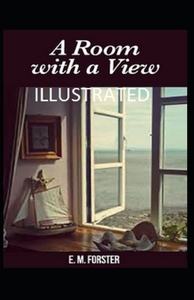You need to sign in or sign up before continuing.
Take a photo of a barcode or cover
This was good. I've put it off for some time just because it didn't seem that appealing. But it was nice, quick and sweet. I liked it
A lovely book! Those characters, haha, I love them!
emotional
lighthearted
reflective
slow-paced
Plot or Character Driven:
Character
Strong character development:
Yes
Loveable characters:
Yes
Diverse cast of characters:
No
Flaws of characters a main focus:
Yes
I have loved this book ever since my older cousin (who I thought was so sophisticated as she lived in "exotic" England), introduced me to the gorgeous movie "A Room with a View" with the stellar cast of Helen Boham Carter, Julian Sands, Maggie Smith, Judi Dench and Daniel Day-Lewis when she visited Australia with her family for a hot summer Xmas when she was 17 and I was 14. The book is perfect too and at this time in my life I wanted to re-read a book that made me happy and nostalgic for memories when I was first introduced to it as a teenager.
It was published in 1908 when it was popular for Edwardian English tourists to visit Italy. Lucy Honeychurch is on holiday with her cousin and chaperone Charlotte when she meets an unorthodox young Englishman named George. During the novel, she is forced to confront the restrictions of Edwardian society, what is expected of her and her feelings for George.
It is beautifully written and there are so many funny, laugh-out-loud lines about English society, class differences and the roles of women in Edwardian society. I also love how E M Forster intertwined the theme of a "view" both literally and metaphorically throughout the novel. I would highly recommend this lovely English classic.
It was published in 1908 when it was popular for Edwardian English tourists to visit Italy. Lucy Honeychurch is on holiday with her cousin and chaperone Charlotte when she meets an unorthodox young Englishman named George. During the novel, she is forced to confront the restrictions of Edwardian society, what is expected of her and her feelings for George.
It is beautifully written and there are so many funny, laugh-out-loud lines about English society, class differences and the roles of women in Edwardian society. I also love how E M Forster intertwined the theme of a "view" both literally and metaphorically throughout the novel. I would highly recommend this lovely English classic.
simple english romance book. was surprised by how randomly funny some moments were. easy read. very spring and pretty imagery
This quietly funny, britishly elegant classic felt long for 200 pages but it was an enjoyable slow read. I liked its cyclical beginning and end in Italy.
I liked its reference and increasingly significant meaning of views. When you're a tourist, you notice and appreciate all these tiny details, and think them spectacular. However, the things you're familiar with become mundane and unnoticed. Lucy thinks, "She might be forgetting her Italy, but she was noticing more things in her England."
I liked its New Woman hints at the old tired ways of gender roles for women. Lucy starts to speak up for herself in what she wants, and there's a great (civil) breakup scene in which she candidly explains why her engagement is over. She struggles and finally rebels against the societal expectation to tamp down emotion and be false for the sake of civility.
Much of the story was also funny. Not in your face. But small quips jump out here and there and surprise you.
I liked its reference and increasingly significant meaning of views. When you're a tourist, you notice and appreciate all these tiny details, and think them spectacular. However, the things you're familiar with become mundane and unnoticed. Lucy thinks, "She might be forgetting her Italy, but she was noticing more things in her England."
I liked its New Woman hints at the old tired ways of gender roles for women. Lucy starts to speak up for herself in what she wants, and there's a great (civil) breakup scene in which she candidly explains why her engagement is over. She struggles and finally rebels against the societal expectation to tamp down emotion and be false for the sake of civility.
Much of the story was also funny. Not in your face. But small quips jump out here and there and surprise you.
funny
lighthearted
slow-paced
Plot or Character Driven:
Plot
Strong character development:
Yes
Loveable characters:
No
Diverse cast of characters:
Yes
Flaws of characters a main focus:
Yes
This bored me to death but it also had funny moments so....
Maybe i should stick to reading classics in Spanish because good lord this book felt eternal
Maybe i should stick to reading classics in Spanish because good lord this book felt eternal
emotional
funny
lighthearted
medium-paced
Plot or Character Driven:
A mix
Strong character development:
Yes
Loveable characters:
Complicated
Diverse cast of characters:
No
Flaws of characters a main focus:
No
Forster definitely has a gift for drawing out the odd and sometimes painfully awkward ways that human beings relate to one another. Whether it's Charlotte insisting that she's a nuisance in order to hear protestations in her favor or Cecil being a pompous asshat who looks down his nose at everyone, Forster creates memorable characters who ring true to life in one way or another.
I also appreciated the idea behind this story: A young woman learns to overcome the judgment of others to pursue her own desires and the man she loves rather than remaining within the expectations of her class and family. (I suppose this review contains spoilers but this is outlined pretty clearly on the back cover copy, which the audiobook narrator read aloud at the start of the audiobook for some reason??) In practice, however, that was not what I experienced in this book. Yes, Cecil was terrible and I was happy when Lucy let him go, but I was honestly cheering for her to go off on world travels by herself like she almost did. George, far from being a romantic lead, was moody and awkward and kept kissing Lucy without asking. If there had been some genuine chemistry between them, or if Lucy had had some explicit reflections like, "I wish I could be with George but he is not of my class so it would never work," then I might have been rooting for them to get together. But the only reason we know Lucy has any feelings for him is because we're told a few times that she feels odd around him, and then later on that she would know she loved him if she let herself think about it. If you take away those feelings — which Lucy herself doesn't take the time to explore and interpret — what you're left with is an awkward dude who throw Lucy's photographs in the river, kisses her multiple times because he "can't help himself," and doesn't trust her when she tells him she's not interested and that he's acting inappropriately. (When Cecil asks before kissing Lucy, Forster has to emphasize for the reader how cold and passionless this makes Cecil and what a contrast it is to George's "passion" that leads him to repeatedly kiss Lucy without asking. #ThanksIHateIt)
Even though this is ostensibly a story about Lucy finding her true self and her independence, she's talked into her two key decisions by men. First, George gives her a long lecture about Cecil that makes her finally realize how terrible Cecil is so that she breaks off their engagement, and then Mr. Emerson won't listen to Lucy and keeps insisting that she really does love George and should marry him until Lucy finally decides he's right. Although we're rightly made to dislike Cecil for the way he condescends to Lucy and doesn't trust her to make her own decisions, we don't see George illustrating a different way of relating to Lucy; he, too, tells her that he knows better than she does how she really feels about Cecil, and then his father thinks he knows better than Lucy how she feels about George. I would have liked to see Lucy recognize her own inner feelings without having to have a man explain them to her.
One note on the audiobook: I don't know where Davidson recorded it, but at times it sounds like he's in a call center, as you can clearly hear other voices in the background. I've never encountered that on an audiobook before and it was very distracting.
In conclusion, Forster is a talented writer who wrote a great cast of characters and then completely undermined his own message with the way he went about bringing together the supposed romantic leads.
I also appreciated the idea behind this story: A young woman learns to overcome the judgment of others to pursue her own desires and the man she loves rather than remaining within the expectations of her class and family. (I suppose this review contains spoilers but this is outlined pretty clearly on the back cover copy, which the audiobook narrator read aloud at the start of the audiobook for some reason??) In practice, however, that was not what I experienced in this book. Yes, Cecil was terrible and I was happy when Lucy let him go, but I was honestly cheering for her to go off on world travels by herself like she almost did. George, far from being a romantic lead, was moody and awkward and kept kissing Lucy without asking. If there had been some genuine chemistry between them, or if Lucy had had some explicit reflections like, "I wish I could be with George but he is not of my class so it would never work," then I might have been rooting for them to get together. But the only reason we know Lucy has any feelings for him is because we're told a few times that she feels odd around him, and then later on that she would know she loved him if she let herself think about it. If you take away those feelings — which Lucy herself doesn't take the time to explore and interpret — what you're left with is an awkward dude who throw Lucy's photographs in the river, kisses her multiple times because he "can't help himself," and doesn't trust her when she tells him she's not interested and that he's acting inappropriately. (When Cecil asks before kissing Lucy, Forster has to emphasize for the reader how cold and passionless this makes Cecil and what a contrast it is to George's "passion" that leads him to repeatedly kiss Lucy without asking. #ThanksIHateIt)
Even though this is ostensibly a story about Lucy finding her true self and her independence, she's talked into her two key decisions by men. First, George gives her a long lecture about Cecil that makes her finally realize how terrible Cecil is so that she breaks off their engagement, and then Mr. Emerson won't listen to Lucy and keeps insisting that she really does love George and should marry him until Lucy finally decides he's right. Although we're rightly made to dislike Cecil for the way he condescends to Lucy and doesn't trust her to make her own decisions, we don't see George illustrating a different way of relating to Lucy; he, too, tells her that he knows better than she does how she really feels about Cecil, and then his father thinks he knows better than Lucy how she feels about George. I would have liked to see Lucy recognize her own inner feelings without having to have a man explain them to her.
One note on the audiobook: I don't know where Davidson recorded it, but at times it sounds like he's in a call center, as you can clearly hear other voices in the background. I've never encountered that on an audiobook before and it was very distracting.
In conclusion, Forster is a talented writer who wrote a great cast of characters and then completely undermined his own message with the way he went about bringing together the supposed romantic leads.





